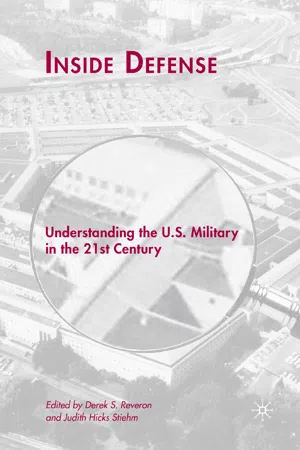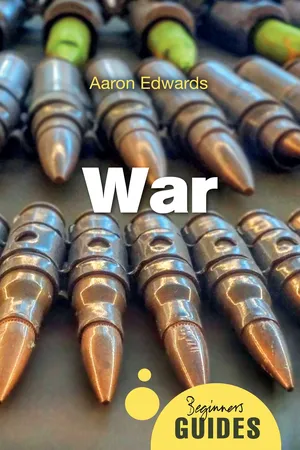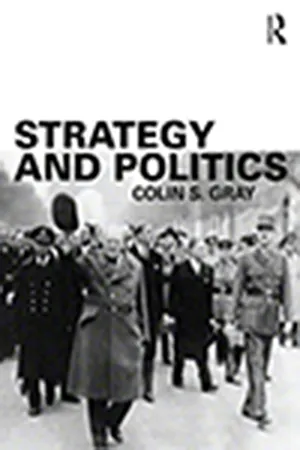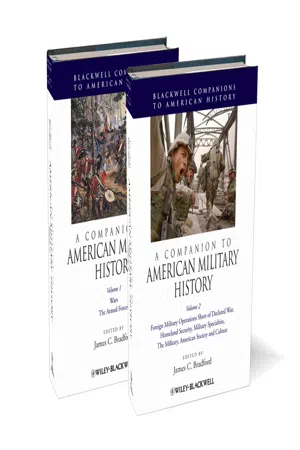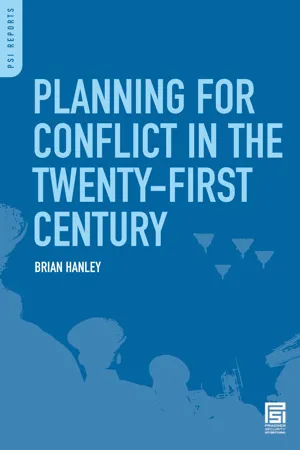History
American War Strategy
American war strategy refers to the overall approach and tactics employed by the United States in military conflicts. It encompasses the planning, decision-making, and execution of military operations to achieve specific objectives. American war strategy has evolved over time, influenced by factors such as technological advancements, geopolitical considerations, and lessons learned from past conflicts.
Written by Perlego with AI-assistance
Related key terms
1 of 5
5 Key excerpts on "American War Strategy"
- eBook - PDF
Inside Defense
Understanding the U.S. Military in the 21st Century
- D. Reveron, Kenneth A. Loparo, Judith Hicks Stiehm(Authors)
- 2016(Publication Date)
- Palgrave Macmillan(Publisher)
A comprehensive review of this enormous literature is beyond my scope here. 1 Instead, I will provide an introduction to the subject by presenting some key dis- tinctions and organizing principles, and by sketching a few of the more important debates about the subtopic of major interstate war. While this excludes much, it is at least a point of departure for the study of strategy , and it may serve to illustrate the richness of the subject matter. The later chapters in this book explore these ideas in concrete terms as strategy relates to the U.S. military , its relationship with the State Department, and its use as a foreign policy tool. This theoretical chapter lays the foundation for that discussion using as a framework the distinction between the levels of war. Much as international relations observes a distinction between levels of analysis (system, unit, individual), so strategic studies distin- guishes the grand strategic, military strategic, operational, and tactical levels of war. Each involves a different set of issues, a different range of variation in state practice, and different considerations for success. Proficiency at one does not necessarily imply proficiency at another , and no one dominates the others as a determinant of success or failure in war. Grand Strategy Grand strategy is the level of war most familiar to most political scientists. It defines the state’ s ultimate objectives and prescribes means for pursuing them, including the military , economic, diplomatic, social, and political instruments of national policy. American grand strategy in the Cold War , for example, defined U.S. objectives as fundamentally defensive (the containment of what was seen as an expansionist Soviet opponent). - eBook - ePub
War
A Beginner's Guide
- Aaron Edwards(Author)
- 2016(Publication Date)
- Oneworld Publications(Publisher)
It might even be said that, of the three levels, strategy is the most important, for in Clausewitz’s immortal words, it makes ‘use of the engagement for the purpose of the war’. 48 The key lesson here is that brilliance at the lower levels of war cannot compensate for a flawed strategy further up the chain of command. US military intervention in the Vietnam War (1965–73), the Iran–Iraq War (1980–8) and the first and second Gulf wars (1990–1 and 2003–11) demonstrate the truism that success in war is only guaranteed if competence at all levels is evident. 49 With this in mind, this chapter explores the relationship between strategy and tactics, in particular, and argues that only by adopting the right strategic approach can success in war be assured. In general terms, strategy is the umbilical cord that connects policy to military tactics. It is a political process that can bring success or failure, victory or defeat, and, ultimately, either further conflict or peace. By itself military strategy can rarely service the grand strategic goal. In the case of grand strategy, states frequently try to wield military might and political, diplomatic, and economic power for the specific objective of securing the ends as laid down by the government of the day. In simple terms, grand strategy provides the plan by which states navigate their way through the international system. It shirks short-termism and instead makes bold assertions about the future, which are generally the product of the intellect and experience of its most talented minds. Strategy, in the way it is practised in war, argues Professor Colin S. Gray, is ‘ the use that is made of force and the threat of force for the ends of policy ’. 50 The powerful influence of strategic ideas in war ought to be obvious, though this is not always the case. Strategist J. C - eBook - ePub
- Colin S. Gray(Author)
- 2016(Publication Date)
- Routledge(Publisher)
Arguably it is unfortunate that in wars commanded by limited goals for strategy, the military and consequentially the political results most typically are only very limited, and, one might say, deservedly. Because war and its warfare are a psychological as well as physical and material happening, a stronger will always are likely to succeed in conflict. The theory of limited war in respect of strategy was always at severe risk of falsification by a belligerent unmistakeably materially inferior, who was so high in motivation to fight that the obviously superior belligerent would be outlasted and outcompeted. In asymmetrical war, which is virtually a definitional quality in irregular conflicts, the theory and attempted practice of limited war frequently has resulted in the defeat of Western states. Every episode of war reveals strong similarities in experience. It is especially pertinent to recognize, for examples, commonalities among the United States in Vietnam in the 1960s, the Soviet Union in Afghanistan in the 1980s, and most recently America and Britain in Afghanistan and Iraq in the 2000s. Unilateral calibration of distinctly limited military effort, directed by constrained strategy in pursuit of limited policy objectives, is likely to fail if the enemy of the day scores highly on the index of motives to fight we can derive from Thucydides.Varieties of war, but politics as usualIt is an empirically well founded belief behind this text that my subject can and ought to be understood as comprising two permanent themes in history, strategy and politics, and that there is no good enough reason to elevate either change or continuity as the dominant partner. Although strategies and political choices are ever changing, those changes must occur only within the fundamental and therefore persisting conceptual space appropriate to each. The politics most relevant here are those explained with reference to power, understood as influence over thought and behaviour (Lasswell, 1936; Mearsheimer, 2014: Ch. 2). In these terms, politics can be regarded as a function vital for all communities, particularly in respect of their need for security. The function of strategy has been required through all of history, even though this need has been expressed with different emphases in particular places and periods. The permanence of our political and strategic histories, considered functionally, is expressed most suitably in a common ironical French aphorism: plus ça change, plus c’est la même chose - eBook - PDF
- James C. Bradford, James C. Bradford(Authors)
- 2009(Publication Date)
- Wiley-Blackwell(Publisher)
However, this view is untenable. The US Army had little if any influence over the US Navy or US Air Force, and it was the american way of war 853 largely air-power concepts, in any case, which shaped the “new” American way of war (Hammond 2005). Rather, America’s current battle-focus extends across the services, and indeed one would find it in evidence in most Western militaries. Within the United States, moreover, the tradition of preserving civilian author- ity over the military has at least partly perpetuated this battle-focus by separating diplomacy and the conduct of war into different spheres. In short, policy-makers focused on the diplomatic struggles preceding and issuing from the fighting, while commanders concentrated on winning battles and campaigns. Moving from a battle- to a war-focus would require at least two things to happen. First, civilian expertise (not just authority) must extend into the operational sphere, and com- munication between policy-makers and military commanders must remain open and continuous. Policy-makers must increase their knowledge of, and comfort with, the vast array of military operations. Second, military commanders must study more deliberately the kinds of political objectives the art of war has had to accomplish over the years, and then build military science around those objectives. The goal would be to establish a habit of thought that readily links political objec- tives to military ones. If or when these things happen, a new category in the study of the American way of war might just emerge, one exploring the extent to which the American method of waging war overlaps with and complements, or not, the American way of strategy (Lind 2006). Until then, readers will have to wait and see whether the American way of battle can actually mature into a genuine way of war. Bibliography Anon (2003). “Champion of ‘A New American Way of War,’ ” Sea Power, 46:6 (June), 15–16. - Brian Hanley(Author)
- 2007(Publication Date)
- Praeger(Publisher)
Chapter 1 Lessons Not Learned: Strategy, War Plans, and the United States Armed Forces The most influential official document of the twentieth century came not from the desk of a head of state, but from the hand of an officer in charge of a military planning staff. The aims and assump- tions of the Schlieffen Plan reflected the vainglory of European civi- lization, as well as the antagonisms and rivalries that in maturity would undermine a culture more than 500 years in the making. War is the single greatest actuator of human progress and misery, and one cannot understand the twentieth century—culturally, politically, demographically—without grasping the causes of the First World War and its aftermath. War plans determine whom we fight, how we fight, where and under what provocation we fight—and to a large extent they shape the peace that follows. All plans take into account the uncertainty of war, but those that are judiciously conceived limit the unattractive options that confront civilian and military decision makers once the shooting starts. In the American mind, the establishment of a general staff devoted to building war plans in the abstract has always been a faintly disrep- utable idea. There are a number of reasons for what seems to be an implausible cultural trait, given the supremacy of our military might at the beginning of the twenty-first century. Like most every other nation, the United States was established by war, which in our case was less a revolution than an act of secession realized by violence. But unique among major powers in the Western world, the founders of the United States quite consciously eschewed anchoring their legitimacy in military prowess, either their own or that of their ancestors. The United States was and perhaps still is seen as a grand experiment: a country founded on rights that inhere in the individual, and that is devoted to free enterprise.
Index pages curate the most relevant extracts from our library of academic textbooks. They’ve been created using an in-house natural language model (NLM), each adding context and meaning to key research topics.
